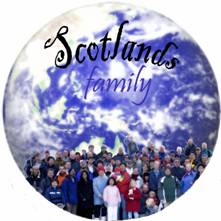|
.
AVAILABLE SCOTTISH
GENEALOGY RESOURCES
Births
and baptisms data
Marriages data
Censuses
Directories & Lists
Poorhouses
Occupations
Diseases & Medical terms
DNA Testing
Map
of Scotland
County map
Parish maps
Gazetteer
Books
& Film
Statistical Accounts of Scotland
Scots Dictionary
Research
help
Links
Top UK Betting Sites
 |
Stories on
Searching for Scottish Ancestors ...........
A Ross by any other Name?
A common fallacy is that the
spelling of your surname is fixed, immutable and unchanging. That may be
true today, but we only have to go back two or three generations to find
spelling differences on registers, certificates, and Census forms. Rose
and Ross, Muir and Moore, Millar and Miller- different names today
certainly, but at one time used indiscriminately.
I recently researched for an American client called McGruder and found
that her Scottish family records threw up MacGrudder, MacGruther,
MacGrouder, MacGrewer, MacGruar, and even MacGrowther. There is no right
or wrong spelling. Some of these spellings have since become fixed ,
but 200 or 300 years ago the name (meaning "son of the brewer") was simply
spelt as the registrar or census enumerator thought it was spelt. There
was no holy grail of uniform spelling.
Most people if asked whether surnames or first names have the longest
historical pedigree, would answer surnames, but they would be wrong.
In the early historical records of Scotland it is only single personal
names we find. For example in the charter of 1094 of King Duncan to the
monastery of St Cuthbert, the monks are listed as Malcolum, Ulf, Hemming,
Eadger, Aelfric and so on. In small communities there was no need for
second names. In the 13th century with an increase in population “sur”-names
or additional names start to appear more often.
The first people in Scotland to acquire fixed surnames were the nobles and
great landowners who called themselves after the lands they possessed. But
before everyone today with the surname Gordon, Mar, Stirling, Houston,
Crawford, or Hamilton starts imagining the nobility of their ancestors, I
should add that many of the tenants of the great estates later followed
their landlord in using the estate name as their second name.
One of the commonest sources of surnames is patronymic, i.e. in relation
to the father. Son is added to the Christian name, like Thomson, Johnson,
Dickson. Others have the same derivation but are less obvious. Dawson is
an abbreviation of Davidson, while Watson was Walterson. Sometimes the
“on” was then dropped to create Andrews, Richards, Edwards.
In Scandinavia patronymic name change continued for generation after
generation without fixing surnames. For example my Norwegian father-in-law
was baptised Martin Ellingsen, and his father was Andreas Ellingsen.
However his grandfather was Elling Torgersen, who was the son of Torger
Ellingsen, who was the son of Elling Johnsen. In Shetland and Orkney the
influence of Norse patronymic naming is evident. One of my ancestors from
Unst was born around 1780 and named Agnes Williamsdaughter. On her death
certificate in Leith in 1871 she is referred to as Agnes Smith maiden name
Hughson. From this I can deduce her father’s name was William Hughson, and
her grandfather’s name was Hugh ……
In Highland Scotland, the Gaels used the prefix “mac” to denote “son of” -
MacDonald, son of Donald; MacPhail son of Paul; Macgowan, son of the
smith; Macintosh, son of the leader. As these surnames stabilised they
were taken up by the ordinary clansmen of the area, just as in the lowland
areas many tenants took up their landlord’s surname. In Ireland “mac” was
one of two ways of denoting “son of”, the other prefix being “ua” or “o”,
hence O’Neill, O’Leary.
Another major source of surnames were from descriptions of a trade or
occupation.The Ragman Roll of 1296 includes these names:
Symon le Glover, Perth; Robert le Taillour, Stirling ;
Walter the Goldsmith, Edinburgh; Aleyn le Barbur, Ayr ;
Johan le Mareschal, Roxburgh; Thomas le Whright, Lanark ;
Thomas le Breuester, Lanark ; Johan le Botiler
Then of course there are names based on a description of physical
peculiarities such as Longman, Broadhead, Cudlipp, Crookshank, Hawkey(e).
A characteristic Orkney name is Scollay, which in Old Norse means “skalli”
or bald. Finally while England is responsible for Ramsbottom,
Scotland can lay claim to Sowlug, Aydrunken, and Hangpudying.
No, best not ask!
.....................................................................................................................................................
This
article by Dr Brian Thomson of
Scot Roots was first published on the web
in the
Scottish
Radiance magazine in October 2000.
If you would like
a story from your family history published here please send to
stories@scotlandsfamily.com for consideration . From 200
words to 500 words max please.
|
|

